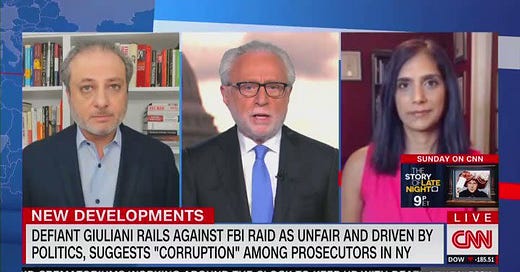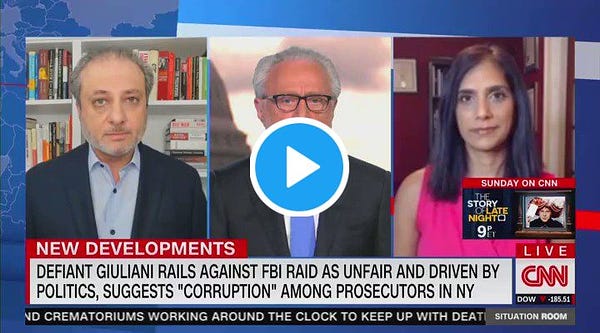In a hearing today before a subcommittee of the House Armed Services Committee charged with investigating technology and information warfare, cyber policy and national security expert Dr. Herb Lin of the Hoover Institution told lawmakers that in the modern era we are not formally at war, but we are not at peace either:
“Information warfare threat to the United States is different from past threats, and it has the potential to destroy reason and reality as a basis for societal discourse, replacing them with rage and fantasy. Perpetual civil war, political extremism, waged in the information sphere and egged on by our adversaries is every bit as much of an existential threat to American civilization and democracy as any military threat imaginable.”
His warning comes two days after the power of warfare waged with disinformation once again became a top story in the U.S. On Wednesday, federal officials executed a search warrant on the home and office of Trump’s former lawyer Rudy Giuliani. To conduct such a search, investigators had to convince a judge that they had good reason to think a crime had been committed.
Investigators appear to be focusing on Giuliani’s successful attempt to get the American ambassador to Ukraine, Marie Yovanovitch, recalled on April 24, 2019. Yovanovitch was one of our very top diplomats. She stood firmly against corruption in Ukraine, earning the fury of oligarchs connected to Russia, especially Ukraine president Petro Poroshenko; the country’s prosecutor general, Yuriy Lutsenko; and the country’s former prosecutor general, Viktor Shokin, who was fired for corruption. They wanted her gone.
On the surface, the case is about whether or not Giuliani was working for Ukrainian oligarchs as well as Trump when he undermined Yovanovitch. But it is really a story about disinformation. Giuliani wanted Yovanovitch out of the way because she refused to enable his attempt to manufacture dirt on the son of then-candidate Joe Biden, an effort designed to make it possible for Trump to win reelection.
A quick recap of the Yovanovitch part of the story: In late 2018, Ukraine-born American businessman Lev Parnas introduced Giuliani to Shokin, who was willing to say that he was fired because he was looking into Burisma, a company on whose board Hunter Biden sat (this was false). In December, Parnas and his partner Igor Fruman attended the annual White House Hanukkah party. Parnas later told people they had a private meeting with Trump and Giuliani, who gave them “a secret mission” to pressure the Ukrainian government to announce an investigation into the Bidens.
In January 2019, Giuliani tried to get a visa for Shokin to come to the U.S., but Yovanovitch denied it. So Giuliani, Parnas, and Fruman interviewed Shokin and Lutsenko where they were.
For the next three months, Lutsenko and Giuliani sparred over the announcement of an investigation into the Bidens, apparently in exchange for the removal of Yovanovitch. Meanwhile, in the U.S., journalist John Solomon, who was in contact with Lutsenko, wrote articles for The Hill attacking both the Bidens and Yovanovitch, and claiming that it was Ukraine, not Russia, that interfered in the 2016 election.
And then on April 21, Porosheko lost a presidential election to Volodymyr Zelensky.
On April 23, Giuliani announced on Twitter that Ukraine was investigating Hillary Clinton’s campaign and the DNC for conspiring with “Ukrainians and others to affect 2016 election.” And the next day, Yovanovitch was recalled.
The rest is history (sorry!): in the infamous phone call of July 25, 2019, Trump asked Zelensky to announce an investigation into the Bidens before the U.S. would release congressional appropriations to enable Ukraine to fight Russian incursions, a whistleblower complained, the Department of Justice tried to hide the complaint, and the Trump presidency began to unravel.
As the Ukraine scandal worked its way toward the president’s impeachment, Giuliani did not let up on his insistence that Ukraine, not Russia, had tried to undermine the 2016 election, and he continued to push that lie. By late 2019, the FBI warned Giuliani that Russian intelligence was targeting him to circulate lies about Biden. (It also warned One America News.) According to former FBI Special Agent and lawyer Asha Rangappa, officials likely did so both as a warning and to see if he would break away from the disinformation. He did not.
What is at stake in the recent story of the federal investigation of Giuliani is the role of disinformation in our politics. Crucially, Giuliani and Trump did not want an actual investigation of the Bidens: they just wanted an announcement of an investigation. An announcement would be enough for the media to pick up the story, and the fact it was made up out of whole cloth wouldn’t matter. People would believe there was something fishy with the man whom Trump feared (rightly, as it turned out) as his chief rival for the presidency, and his candidacy would be hobbled.
It doesn’t matter, Dr. Lin pointed out to the subcommittee today, whether foreign actors are working in concert or in parallel with American actors when they spread disinformation: the destabilizing effect is the same.
—-
Notes:
https://armedservices.house.gov/hearings?ID=142102B1-A2F8-44E5-B000-CB328CDFE196
https://www.cnn.com/2019/11/15/politics/parnas-trump-special-mission-ukraine/index.html




Every time the topic of the fake president, Guiliani, and the Ukraine scandal raises it's ugly head, I cringe regarding what they did to two innocent scapegoats in particular: Ambassador Yovanovitch and Lt. Col. Vindman.
As our ambassador to Ukraine, Yovanovitch became the victim of defamation and dirty politics by Guiliani and the sitting, imposter POTUS. Lt. Col. Vindman, then Director of European Affairs in the White was equally diminished. Both lost their positions and were treated as personae non grata!
IMHO, they both deserve a formal apology from the US government, medals of honor, and huge monetary compensations.
Thank you for going beyond the 100 days, dear Prof. HCR. Just please ensure that you don't over-extend yourself -- first and foremost, we want you to remain vibrant and healthy!
Russia is waging all-out cyber war against the US and has been doing so for quite a while. Clemson University researchers Patrick Warren and Darren Linvill have been able to pinpoint exactly how the Russian bots manipulate public opinion.
The Russian social media posts are generated en masse by an industrial-style system created by Putin’s Internet Research Agency. By using a simple user template that could be repeated and tweaked according to specialized types of information, these so-called “troll factories” manufacture lies in much the same way a bottle factory churns out plastic soda bottles. And it works. The bot posts look just human enough to be believed, and the more extreme and angry they are, the more enraged other users become.
One of their most insidious skills is to pile support behind a few human outliers. This way the extreme sentiment comes from a real American, while the bots are agreeable but just polarizing enough to tip the scales. As Linvill has observed: “People are persuaded by things they’re already inclined to believe, not by someone yelling at you. The trolls were trying to be your friends, not your enemies.”
Worst of all, the bots’ stealthy emotional impact tends to linger long after they are discovered and kicked off of social media. This, Warren argues, is where the true danger lies, because their influence is “like an infection. It spreads into the social media ecosystem. And even when you take away that vector, you’ve done lasting damage to the body.” This body is not just the Twitter-verse, but American society and democracy, itself. As the U.S. Senate’s Select Committee on Intelligence notes, the Russian trolls are intended to “stoke anger, provoke outrage and protest, push Americans further away from one another, and foment distrust in government institutions.” Our best option for protecting ourselves against this infectious disease of collective illusion is to understand what it looks like, and how it spreads.